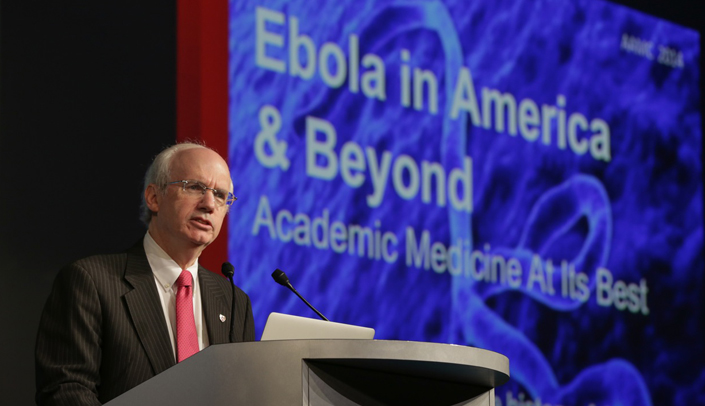UNMC Chancellor Jeffrey P. Gold, M.D., was asked to share his unique perspective on UNMC’s response to the Ebola crisis in a special session Monday at the Association of American Medical Colleges annual meeting in Chicago.
CDC adopts UNMC policies
The procedures and policies developed by UNMC’s biocontainment team have been adopted by the Centers for Disease Control and Prevention. Videos and learning modules have been developed by the team for use around the world to help train health professionals and inform the public regarding Ebola.
“We learned that a decade of planning and practice matters along with care to every tiny detail and logistics,” Dr. Gold said. “Partnerships and communication with worldwide & U.S. resources are key, and yes, public and political opinions have an impact.
“This was a true test of leadership of American academic medicine. I believe it demonstrates that together, we will change a challenge to an opportunity.”
Dr. Gold gave his presentation — “Ebola: Why Our Nation’s Academic Medical Centers are Uniquely Prepared to Respond” — with Nicole Lurie, M.D., assistant secretary for preparedness and response at the U.S. Department of Health & Human Services.
UNMC was the first independent academic health center to care for an Ebola patient. Dr. Gold outlined how academic health centers have a proven value.
“This is where the best combination of relevant educational programs, groundbreaking discovery, world-class health care delivery and broad community engagement come together,” he said.
UNMC and Nebraska Medicine are uniquely positioned to provide extraordinary care, especially in time of crisis because of certain advantages, he said.
“We’re in the middle of the United States,” Dr. Gold said. “The U.S. Strategic Command (USSTRATCOM) and Offutt Air Force Base are located right outside Omaha and our campus is home to the Nebraska Public Health Lab.”
In addition, UNMC researchers have active projects in the University of Nebraska’s National Strategic Research Institute, a collaboration between NU and USSTRATCOM to support research for combating weapons of mass destruction.
After providing some history on UNMC’s Biocontainment Unit, Dr. Gold offered details about the core team of volunteers from the hospital and UNMC, noting that an additional 40 volunteers signed up since the Ebola outbreak.
“Ever since the unit opened in 2005, the team has drilled quarterly with the community’s first-responders and the state department of health. The drills keep the team fully engaged and emotionally supported. Their ongoing research enables the team to fine-tune policies and procedures,” he said.
“Our biocontainment unit was designed for this type of scenario, and our health care staff members are experts who have received countless hours of training for this type of event.
“That’s why they were so successful in the treatment of two people with Ebola. Our biocontainment team demonstrated confidence and competence. They were in constant contact with national and international agencies regarding treatment, and they communicated often and honestly with the public,” Dr. Gold said.
“Some fears and much curiosity were expressed, but overall, the citizens of Nebraska were incredibly supportive.”
